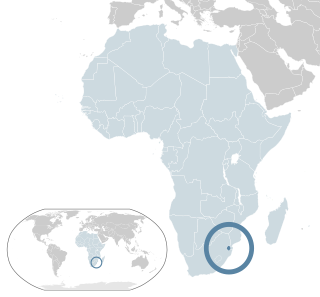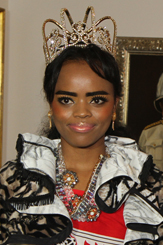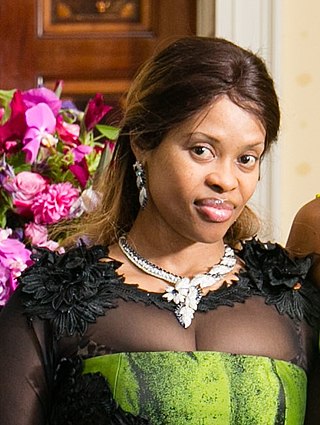Related Research Articles
Polygamy is the practice of marrying multiple spouses. When a man is married to more than one wife at the same time, sociologists call this polygyny. When a woman is married to more than one husband at a time, it is called polyandry. In sociobiology and zoology, researchers use polygamy in a broad sense to mean any form of multiple mating.

Eswatini, officially the Kingdom of Eswatini and formerly named Swaziland, is a landlocked country in Southern Africa. It is bordered by Mozambique to its northeast and South Africa to its north, west, south, and southeast. At no more than 200 km (120 mi) north to south and 130 km (81 mi) east to west, Eswatini is one of the smallest countries in Africa; despite this, its climate and topography are diverse, ranging from a cool and mountainous highveld to a hot and dry lowveld.

In cultures where monogamy is mandated, bigamy is the act of entering into a marriage with one person while still legally married to another. A legal or de facto separation of the couple does not alter their marital status as married persons. In the case of a person in the process of divorcing their spouse, that person is taken to be legally married until such time as the divorce becomes final or absolute under the law of the relevant jurisdiction. Bigamy laws do not apply to couples in a de facto or cohabitation relationship, or that enter such relationships when one is legally married. If the prior marriage is for any reason void, the couple is not married, and hence each party is free to marry another without falling foul of the bigamy laws.

Swazi culture is the way of life and customs of the Swazi people through various historical stages. The culture of Swazi people involves music, food, religion, architecture, and kinship, among many other things. The Swazi people are composed of various Nguni clans who speak the Nguni language siSwati. These people mostly reside in Eswatini and South Africa. Presently, Swazi people may also include citizens of Eswatini. In Eswatini, one of the most visible features of cultural identity is the traditional political structure of the nation and the home. In the national level, the Ngwenyama is considered the head of the nation alongside the Ndlovukati who is the spiritual leader of the nation. National cultural events often involve the Ngwenyama or Ndlovukati. At home, the patriarch of the family is the head and often practices polygamy. This headman, usually referred to as umnumzane is central to all activities of the home. A group of homes forming a community and the land they reside on forms a chiefdom or umphakatsi. Several chiefdoms form an inkhundla which then belongs of a regional division of the country. This connects the older traditional leadership structures to more modern forms of government.

Mswati III is Ngwenyama (King) of Eswatini and head of the Swazi royal family. He was born in Manzini in the Protectorate of Swaziland to King Sobhuza II and one of his younger wives, Ntfombi Tfwala. He was crowned as Mswati III, Ingwenyama and King of Swaziland, on 25 April 1986 at the age of 18, thus becoming the youngest ruling monarch in the world at that time. Together with his mother, Ntfombi Tfwala, now Queen Mother (Ndlovukati), he rules the country as an absolute monarch. Mswati III is known for his practice of polygamy and currently has 15 wives.

The Swazi or Swati are a Bantu ethnic group native to Southern Africa, inhabiting Eswatini, a sovereign kingdom in Southern Africa. EmaSwati are part of the Nguni-language speaking peoples whose origins can be traced through archaeology to East Africa where similar traditions, beliefs and cultural practices are found.

The House of Dlamini is the royal house of the Kingdom of Eswatini. Mswati III, as king and Ngwenyama of Eswatini, is the current head of the house of Dlamini. Swazi kings up to the present day are referred to as Ingwenyama and they rule together with the Queen Mother who is called Indlovukati. The Swazi kings, like other Nguni nations, practice polygamy and thus have many wives and children.

Eswatini is an overwhelmingly Christian majority country, with adherents of Islam being a minuscule minority. Due to secular nature of the Eswatini's constitution, Muslims are free to proselytize and build places of worship in the country.

Lesbian, gay, bisexual, and transgender (LGBT) rights in Eswatini are limited. LGBT people face legal challenges not experienced by non-LGBT residents. According to Rock of Hope, a Swati LGBT advocacy group, "there is no legislation recognising LGBTIs or protecting the right to a non-heterosexual orientation and gender identity and as a result [LGBT people] cannot be open about their orientation or gender identity for fear of rejection and discrimination". Homosexuality is illegal in Eswatini, though this law is in practice unenforced. According to the 2021 Human Rights Practices Report from the US Department of State, "there has never been an arrest or prosecution for consensual same-sex conduct."

Princess Sikhanyiso Dlamini is a Swazi princess and politician. She is the eldest daughter of King Mswati III of Eswatini, and is the country's current Minister of Information and Communication Technology.

Under civil law, Nigeria does not recognize polygamous unions. However, 12 out of the 36 Nigerian states recognize polygamous marriages as being equivalent to monogamous marriages. All twelve states are governed by Sharia law. The states, which are all northern, include the states of Bauchi, Borno, Gombe, Jigawa, Kaduna, Kano, Katsina, Kebbi, Niger, Sokoto, Yobe, and Zamfara which allows for a man to take more than one wife.
The legal status of polygamy varies widely around the world. Polygyny is legal in 58 out of nearly 200 sovereign states, the vast majority of them being Muslim-majority countries. Some countries that permit polygamy have restrictions, such as requiring the first wife to give her consent.
Polygamy is the practice of having more than one spouse; while prohibited under Zimbabwean civil law, polygamous marriages may be performed under the country's customary law. Less than one-fifth of the country's population are engaged in polygamy.
Prostitution in Eswatini is illegal, the anti-prostitution laws dating back to 1889, when the country Eswatini was a protectorate of South Africa. Law enforcement is inconsistent, particularly near industrial sites and military bases. Police tend to turn a blind eye to prostitution in clubs. There are periodic clamp-downs by the police.

Eswatini, Africa's last remaining absolute monarchy, was rated by Freedom House from 1972 to 1992 as "Partly Free"; since 1993, it has been considered "Not Free". During these years the country's Freedom House rating for "Political Rights" has slipped from 4 to 7, and "Civil Liberties" from 2 to 5. Political parties have been banned in Eswatini since 1973. A 2011 Human Rights Watch report described the country as being "in the midst of a serious crisis of governance", noting that "[y]ears of extravagant expenditure by the royal family, fiscal indiscipline, and government corruption have left the country on the brink of economic disaster". In 2012, the African Commission on Human and Peoples' Rights (ACHPR) issued a sharp criticism of Eswatini's human-rights record, calling on the Swazi government to honor its commitments under international law in regards to freedom of expression, association, and assembly. HRW notes that owing to a 40% unemployment rate and low wages that oblige 80% of Swazis to live on less than US$2 a day, the government has been under "increasing pressure from civil society activists and trade unionists to implement economic reforms and open up the space for civil and political activism" and that dozens of arrests have taken place "during protests against the government's poor governance and human rights record".

Polygamous marriages may not be performed in New Zealand. A married person who enters into another marriage in New Zealand is guilty of the crime of bigamy. Similar rules apply for civil unions, which have been legal in New Zealand since 2005. However, polygamous marriages legally performed in another country have limited recognition in New Zealand law, provided that no person involved was living in New Zealand at the time of the union.

Sibonelo Mngometulu, known as Inkhosikati LaMbikiza, is the senior queen consort and third wife of King Mswati III of Eswatini. Sibonelo married Mswati III in 1986, becoming the first wife he personally chose to marry, following two ceremonious marriages. She is the mother of Princess Sikhanyiso Dlamini and Prince Lindani Dlamini.
Polygamy in Guinea is generally illegal. Polygamy is regulated under the new 2019 family law. The new regulations stipulate that a marriage is presumed to be monogamous; however a couple may legally enter into a polygynous marriage if the groom declares that he is opting for polygyny during the marriage ceremony and the bride gives "explicit consent". The new law is the result of a long legislative battle between those who wanted free polygamy without restrictions and those who wanted a complete ban.
Law enforcement in Eswatini is the primarily the responsibility of the Royal Eswatini Police Service, which oversees internal security as well as border and customs control, and His Majesty's Correctional Services (HMCS), which is tasked with maintaining and guarding prisons. It is estimated that about 35% of Government of Eswatini employees work in the security services. The country has been part of INTERPOL since October 1975 and the organization has an office in the capital of Eswatini, Mbabane.

Eswatini nationality law is regulated by the Constitution of Eswatini, as amended; the Swaziland Citizenship Act, and its revisions; and various international agreements to which the country is a signatory. These laws determine who is, or is eligible to be, a national of Eswatini. The legal means to acquire nationality, formal legal membership in a nation, differ from the domestic relationship of rights and obligations between a national and the nation, known as citizenship. Nationality describes the relationship of an individual to the state under international law, whereas citizenship is the domestic relationship of an individual within the nation. Eswatini nationality is typically obtained under the principle of jus soli, i.e. by birth in Eswatini, or jus sanguinis, born to parents with Eswatini nationality. It can be granted to persons with an affiliation to the country, or to a permanent resident who has lived in the country for a given period of time through naturalisation or the traditional khonta system.
References
- ↑ "Swaziland: Laws and customs in Swaziland regarding polygamy", Refworld, Canada: Immigration and Refugee Board of Canada, 9 March 2000, archived from the original on Jan 2, 2015